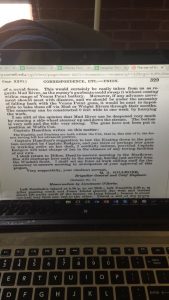I have many problems with the article Neoliberal Tools (and Archives): A Political History of Digital Humanities. But I am going to pick out a few quotes and insert my commentary on them, seeing as if I did a full review of this article it would be well over a few pages.
“It (Digital Humanities) is, instead, about the promotion of project-based learning and lab-based research over reading and writing,”
Oh yes, because all my time is spent on lab-based research.
No reading whatsoever.
See? I’m on my computer, definitely not reading for my research.
Books and traditional humanities research will always be around, we are not trying to replace it but rather expand the field and become more opening and accepting of those who do not work well or do not prefer traditional research methods.
“Digital Humanities instead aims to archive materials, produce data, and develop software, while bracketing off the work of interpretation to a later moment or leaving it to other scholars”
I can see why one would think that with all of the scans and data I’ve been collecting, it seems like I’m just collecting everything and putting it together. Well, I am. Because to interpret research and data, one needs to have data in the first place. Please find me a second-hand source that does not have citations or data.
““Look, not everyone committed to Digital Humanities is a white man.” “Look, there are Digital Humanities projects committed to politically engaged scholarly methods and questions.” We are not negating the value of these exceptions when we ask: What is the dominant current supported even by the invocation of these exceptions?”
White men were the only force in Humanities for centuries up until the last one. Digital humanities is a relatively new field that started from two fields that are both dominated by white men, so is it such a surprise that the first Digital Humanists are white males? The demographics of fields change, it just takes time and willingness of the field to be accepting. I look to go into the field of military history and theory, it is overwhelmingly dominated by white men and I realize that it is going to be hard even though there are women who have succeeded in it before me. The goal is not to conform to the dominant current but rather critique it and give room for expansion of the field to make it better. Which is what Digital Humanities is trying to do. It is trying to expand the field and make it more available to the world, not trying to destroy or minimize the importance of traditional Humanities.
According to Standford, “The humanities can be described as the study of how people process and document the human experience.”
This article takes a false high-ground in humanities, creating an elitism that should not be there. Every human can do humanities because it is about our shared experience in this world, not because you have a higher education level, have read more books, or written more papers. The entire purpose of Humanities is to find what connects us, not how to divide us. Not everyone has the access to great archives or collections, but in this digital age, most people have connection to the internet. Digital Humanities is not replacing traditional Humanities, just expanding and diversifying it. This article is saying Humanities for the humanists, I’m saying Humanities for humans.
-Julia



